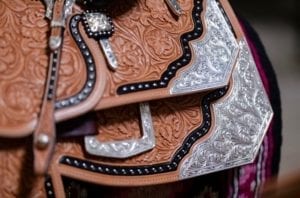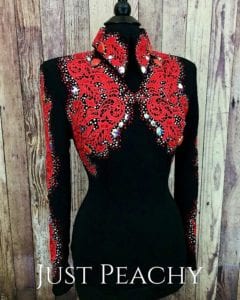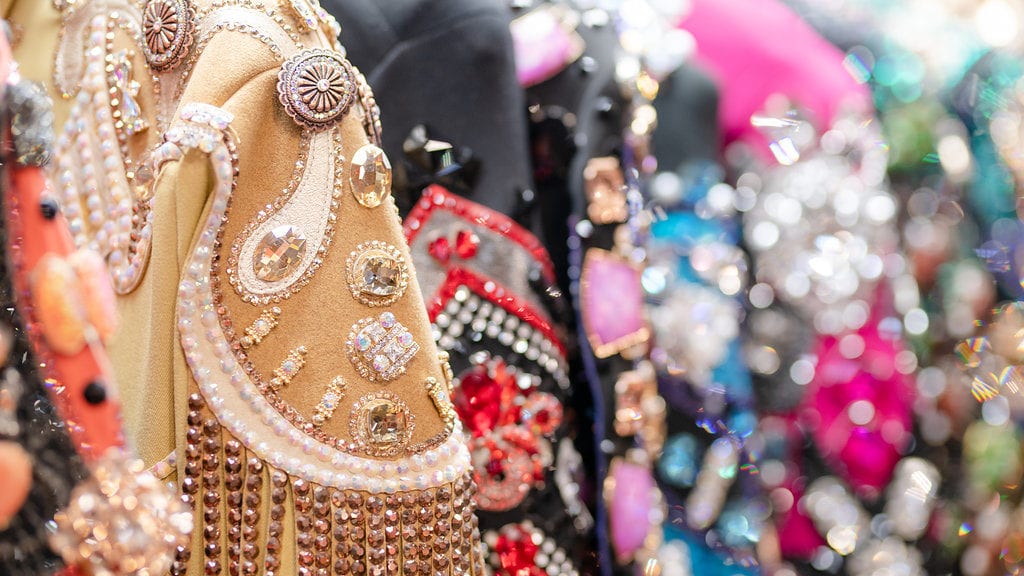Online Facebook groups have become a convenient way to purchase and advertise goods, but specific scams concerning show clothes have become prevalent and, unfortunately, just as the posts or listings get reported, a new scam is created.
Although it can be easy to shop horse show clothes online, one should always be cautious, which is why GoHorseShow is providing some savvy tips to keep buyers safe.
Be aware of current scams
New scams occur every day, but by being mindful, you may decrease the possibility of being scammed.
 When asked about recent scams she may have noticed, Carrie Bachey (pictured right), owner of Just Peachy Show Clothing, mentioned two popular scams. “The first scam I have observed is a person pretending to be a designer posts on Facebook a photo or two of a fancy jacket for sale at an unbelievable price of $300. They include some measurements and usually say something like ‘custom that didn’t work out’ in the description. The buyer sends the money, thinking they’re getting the deal of a lifetime, but they just lost $300 to an unknown person and will never receive the item.”
When asked about recent scams she may have noticed, Carrie Bachey (pictured right), owner of Just Peachy Show Clothing, mentioned two popular scams. “The first scam I have observed is a person pretending to be a designer posts on Facebook a photo or two of a fancy jacket for sale at an unbelievable price of $300. They include some measurements and usually say something like ‘custom that didn’t work out’ in the description. The buyer sends the money, thinking they’re getting the deal of a lifetime, but they just lost $300 to an unknown person and will never receive the item.”
“The second scam has some similarities,” Carrie states, “A person will post a photo of a fancy jacket for sale for an incredibly low price, often with terms like ‘ready to be made in your size.’ Take note that the photos posted are a finished jacket, so how is the jacket ready to be finished in your size if it’s made already? Like the previous example, the photos posted were stolen images from legitimate designers and businesses, so the buyer thinks they’re getting a high-quality garment, but they end up receiving poor quality, ill-fitting replica produced overseas.”
“Although these types of scams are rather common across online forums,” Carrie reflects, “It’s truly unfortunate that they’ve made their way into the horse industry.”
Study the advertisement
If provided with pictures, study them and look for details that indicate it is not an accurate image of the item for sale. One detail could include the image appearing to be too perfect like a stock image.
 When asked how customers can tell they are getting a genuine product, Kristin Titov (pictured left) from Hobby Horse Clothing Company Inc answered, “If not purchasing directly from Hobby Horse or an authorized dealer, I would suggest requesting actual photos of the garment they are purchasing.”
When asked how customers can tell they are getting a genuine product, Kristin Titov (pictured left) from Hobby Horse Clothing Company Inc answered, “If not purchasing directly from Hobby Horse or an authorized dealer, I would suggest requesting actual photos of the garment they are purchasing.”
Titov further suggested, “Also be sure to check for a Hobby Horse label inside the garment. If the item advertised appears to be from a specific brand, then there will most likely be a tag or label that identifies it as such.”
Request more specific photos
Recently, horse show competitor and graphic designer, Victoria Delarosa was attempting to buy a show jacket from a post on a Facebook group until she noticed the images resembled stock images, so she requested additional photos. She advises potential buyers, “Ask for additional pictures, but also specific pictures. I asked for measurements with a tape measure across the bust, and then the seller stopped responding.” It is very reasonable to ask for additional measurements, but it will also reveal if the photos are genuine.
Research serial numbers
 If you see a saddle advertised, you can ask for the serial number. If the seller refuses to share the number, it is highly suspicious, and you probably want to pass on that item. Usually, saddle manufacturers have a registry that tracks self-reported stolen or lost items by tracing the article based on the serial numbers.
If you see a saddle advertised, you can ask for the serial number. If the seller refuses to share the number, it is highly suspicious, and you probably want to pass on that item. Usually, saddle manufacturers have a registry that tracks self-reported stolen or lost items by tracing the article based on the serial numbers.
If you receive the saddle’s serial number, you can call the manufacturer to check if the saddle is reported, but also find out more information about the item like the year it was made.
Typically, English saddles have their number beneath the flap or if you flip the saddle upside down, along the channel. As for Western saddles, usually, their numbers are behind the fender or alongside the skirt.
Investigate further
 Good deals are often hard to come by, but do not get caught in the moment. Victoria Delarosa (pictured left) was able to question the validity of a showmanship and horsemanship set posted on Facebook by not only requesting additional photos but also questioning the seller on information such as the designer of the garment and the reason it was for sale.
Good deals are often hard to come by, but do not get caught in the moment. Victoria Delarosa (pictured left) was able to question the validity of a showmanship and horsemanship set posted on Facebook by not only requesting additional photos but also questioning the seller on information such as the designer of the garment and the reason it was for sale.
Unsatisfied with the answers, Delarosa reported the scammer to the Facebook group, but she was disappointed that “By the time I reported her and the post, she already had a different alias. So, if you’re buying from Facebook, I would recommend researching the seller’s profile and looking for a variety of pictures and posts that show they are a real person.”
Carrie Bachey suggested, “When buying on social media, investigate the seller before you send payment. Ask yourself if this a real person? Are they even involved in the horse industry? Do they post or comment with broken English? If they claim to be a designer or storefront, do they have a website, business page, or sell with a recognized company?” Carrie says, “It may sound cliché, but if something looks too good to be true, it probably is.”
Use secure, traceable transactions
 When you complete authorized transactions with PayPal, the PayPal Purchase & Buyer Protection policy will assist you if there are any problems such as an item not arriving or an item not appearing as described.
When you complete authorized transactions with PayPal, the PayPal Purchase & Buyer Protection policy will assist you if there are any problems such as an item not arriving or an item not appearing as described.
Carrie warns, “When buying from a person you don’t know, never send money using the “friends and family” feature on PayPal as you have no recourse if the seller does not ship or if the item is not delivered as described. If the seller refuses an authorized PayPal payment for goods or services, keep looking; there are always show clothes for sale.”
Likewise, Venmo has a protected purchase program, but, as stated in their user agreement policy, this policy is not valid unless you are purchasing from an authorized Venmo merchant.
Another secure payment method is your credit card, which enables users to file disputes. If you’re concerned about using your credit card number online, you can ask your card issuer for a one-time-use, virtual credit card number for online purchases. This virtual credit card links with your real credit card but provides a randomly generated credit card number so that your information can not be used again after that one purchase with that merchant.
Shop with legitimate businesses
 Properly established businesses have current identification, licensing, and insurance. Bachey urged, “If you’re truly concerned about the risks of buying online, choose to do business with an established, reputable company that offers a return policy.”
Properly established businesses have current identification, licensing, and insurance. Bachey urged, “If you’re truly concerned about the risks of buying online, choose to do business with an established, reputable company that offers a return policy.”
By shopping with a legitimate business, you are avoiding the possible frustration that online scams provide. You can buy used and new goods at various stores, and often there are still some great deals offline too.
Carrie makes the excellent point that “As business owners, we want to help you find the best clothes to suit your needs, and we stand behind what we offer.”
So, although online Facebook groups can be a convenient way to purchase and advertise goods, buyers should know that scam posts circulate quickly and resurface just as fast when reported. It’s essential to be conscious of current scams, use secure payment, and always trust your common sense when buying online.








